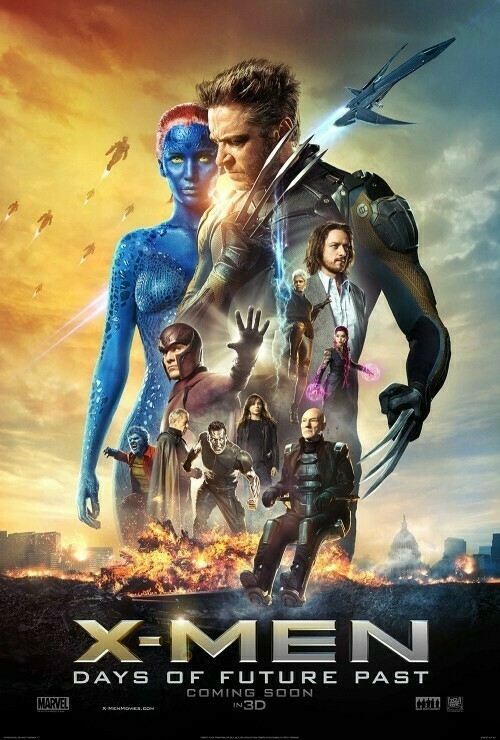Long Form
X-Men: Days of Future Past (2014): A Review
The most remarkable thing about X-Men: Days of Future Past is that it works.
The culmination of 14 years, 7 movies and an almost insurmountable number of continuity issues, this latest mutant adventure takes the smart approach by - well - ignoring most of them.
Directed by Bryan Singer (his first X-Men film since X2: X-Men United in 2003), this movie attempts to go the Avengers route by mashing up the two disparate X-Men movie universes - the original trilogy, which started in 2000’s X-Men (anchored by Patrick Stewart and Ian McKellen, Professor X and Magneto, respectively) and the new prequel universe, launched in 2011’s X-Men: First Class (anchored by James McAvoy and Michael Fassbender as Professor X and Magneto).  How they get there is a matter of ridiculous time travel, the type that only comic books, and now, comic book movies, could accept with a straight face. Take a deep breath, it’s a lot to take in.
Here’s the premise: it’s sometime around (roughly) 2025 - the X-Men we came to know and love in the original trilogy have their backs up against the wall. Mutants - and human sympathizers - have been systematically killed off by mutant hunting robots, called Sentinels, and only a loose rag tag bunch of X-Men remain as the final force against pure mutant elimination. This group of X-Men, co-lead by life-long enemies Professor Xavier and Magneto, includes such mutants as Iceman, Kitty Pride, Storm, and the ageless Wolverine (plus some newbies, like obscure fan favorites such as Bishop and Blink). Â Apparently, at some point, Kitty Pride gained the ability to send ones consciousness into the past. This ability has been used to send mutants “back” hours, or days, at a time to prep for Sentinel onslaughts, but Xavier and Magneto have a bigger plan - send someone back to when it all started - 1973.
Apparently, in 1973, Mystique (Jennifer Lawrence) assassinated Sentinel inventor Bolivar Trask (Peter Dinklage), and his murder set off the production of these Sentinels, leading to decades of death and destruction. So - now they need to send someone back to the 70’s to end this before it happens - and who better to send back than the man who’s outlived them all, Wolverine (Hugh Jackman, in his seventh appearance as the character).
Ultimately, the toughest decision of how to mix these films would be in the execution - writer Simon Kinberg had no easy choice in figuring out the path to go - this film could easily be seen as X-Men 4, First Class 2 or even Wolverine 3 - and thankfully, they decided to follow the freshest path, making Days of Future Past a proper sequel to the breath of fresh air known as X-Men: First Class.
Much how First Class did a fantastic job bringing the X-Men to the 1960’s, with a clear spy influence (and James McAvoy’s fantastic “mutant swinger” take on a young Xavier), Days of Future Past brings the younger X-Men cast into the darker 1970’s. We’re in a post Vietnam world, Xavier is strung-out on a drug that allows him to walk again (but subdues his power), and many of the X-Men in training were killed, or lost to the Vietnam war.
The movie focuses mostly on a core cast of McAvoy’s Xavier, Fassbender’s Magneto, Jackman as Wolverine, Jennifer Lawrence’s Mystique, Dinklage as Trask and…weirdly, Nicholas Hoult’s Beast. Even with as many of the continuity questions that will leave the nerds rambling (I can’t wait to see the insufferable “Movie Mistakes” video that comes out of this), the movie never feels slow or bogged down by the size of its ambition. Instead, X-Men: Days of Future Past focuses on what always made X-Men such a fun comic to read - the drama of the interaction between its characters.  There’s loss of unspoken love, death, destruction, betrayal and confusion here, and it’s absolutely riveting.
That isn’t to say that the movie is without action - the Sentinels, both in their 1970’s and 2020’s forms - are remarkable forces of destruction, and the future in particular is home to some great action sequences - you can tell the filmmakers had particular joy with Blink’s Portal-esq teleporting ability. That said, it speaks volumes that some of the most engrossing work involves character moments between McAvoy, Fassbender and Lawrence. I realize, with two Oscar nominated actors (one winner!) in the mix, that shouldn’t be surprising, but in an era of summer movies filled with city leveling destruction, I applaud the restraint.
The biggest surprise of the film, however? Quicksilver (Evan Peters). Understandably maligned prior to the release of the movie, due to his costuming and the “me too!” nature of his addition, post Avengers 2 announcements, the X-Men version of the mutant speedster is an absolute joy to watch. Less is definitely more with this character, as he ultimately only appears in one major sequence in the film, but his moments are memorable and long lasting. Joss Whedon and crew have a lot to live up to with their version of the character now, and I never thought I’d be saying that. This version of Quicksilver will have everyone talking when they leave the theater.
X-Men: Days of Future Past is a movie that could have been crushed by the scope of its ambition, but by drawing back the urges to make a superhero film that could be lumped into the rest, and standing on the shoulders of its incredibly talented cast, it ends up as an absolute success - in the most unexpected ways. I hope we get to see the McAvoy/Fassbender/Lawrence grouping lead this franchise for years to come. A very high recommendation.
POST CREDIT NOTES: There is indeed a post-credits scene in X-Men: Days of Future Past, and you’ll have to wait through the full credits to get it. No “mid-credit” nonsense here.
Friday May 23, 2014
